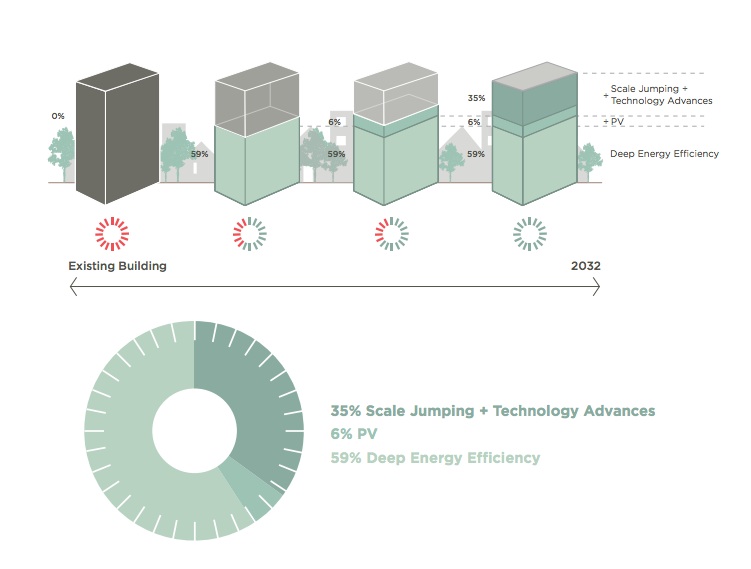The District of Columbia has more green buildings than other large U.S. cities on a per capita basis, according to the 2012 Green Building Report. D.C.’s policies have made it a leader in highly efficient building construction and renovation.
New goals will likely prompt the District to raise the efficiency bar even higher. To help guide policies for a new era of green design, D.C.’s Department of the Environment commissioned a study to assess costs and benefits associated with net zero energy, net zero water, and Living Buildings.
The Net Zero and Living Building Challenge Financial Study: A Cost Comparison Report for Buildings in the District of Columbia was conducted by International Living Future Institute, New Buildings Institute, and Skanska. The team’s analysis identified incremental cost premiums for deep energy and water conservation as well as for photovoltaic and water reuse systems that would bring a project to net zero.
The cost premium for energy efficiency was 1%-12% depending on building type, and rose to 5%-19% for net zero energy. “If the owner has sufficient tax appetite, tax credits and renewable energy credits make the return on investment approximately 30%, whereas the return on investment for energy efficiency alone was in the range of 5-12%,” the report says.
Read the full report at: http://newbuildings.org/net-zero-living-building-challenge-financial-study
Related Stories
| Dec 20, 2012
Valencia College shifts from LEED to Green Globes on new project for more flexibility
The Lake Nona campus of Valencia College in Florida shifted its sustainability standard to Green Globes largely to be able to use a bipolar-ionization system to treat its indoor air -- something LEED didn't allow.
| Dec 20, 2012
LEED-certified schools don’t have to cost more to build, save average of 33% on energy
On average, green schools use 33% less energy and 32% less water than their conventional counterparts, and save $100,000 per year on direct operating costs, according to the U.S. Green Building Council.
| Dec 13, 2012
New OSHA initiatives on tap at AGC safety and health conference
More than 150 industry professionals will discuss the development of regulatory and legislative activity on national and local levels at the Associated General Contractors of America’s health and safety conference.
| Dec 13, 2012
So-called fiscal cliff is already affecting construction jobs, AGC finds
In November, the construction industry shed 20,000 jobs and its unemployment rate reached 12.2%, according to an analysis by the Associated General Contractors of America.
| Dec 13, 2012
New York City poised to enact recycling mandate for multi-family dwellings
New York City lags behind other large cities in recycling with only 15% of residential trash being recycled. A new bill passed by the City Council aims to improve the rate by changing how new apartment buildings are constructed.
| Dec 13, 2012
Pima County, Ariz. officials say improved code enforcement scores will help lower insurance bills
Insurance Service Office, Inc. (ISO) recently analyzed building codes and enforcement and found that Pima County, Ariz., consistently outscored comparable jurisdictions in Arizona and the nation.
| Dec 13, 2012
D.C. aims to be a green leader with new building codes
The District of Columbia has released a revised set of building codes to make it a leader in green construction.
| Dec 7, 2012
Georgia court limits contractors’ ability to foreclose on liens
The Georgia Court of Appeals ruled in 182 Tenth, LLC v. Manhattan Construction Company that lien claimants such as contractors, subcontractors, and materialmen, may not foreclose on a lien that includes unpaid general condition costs.














